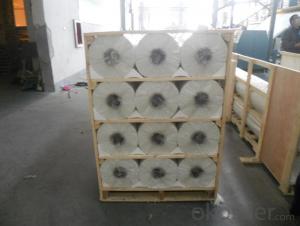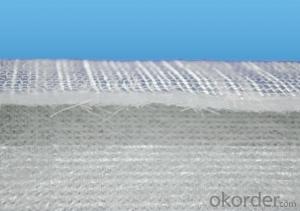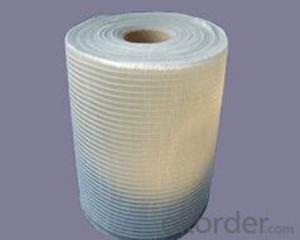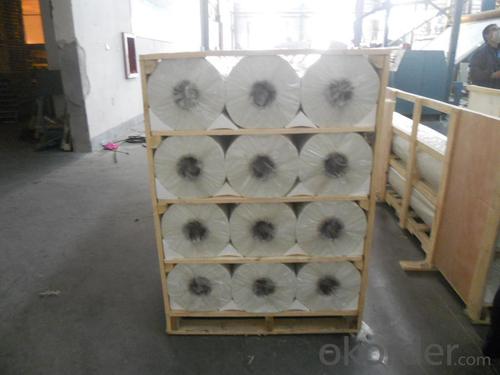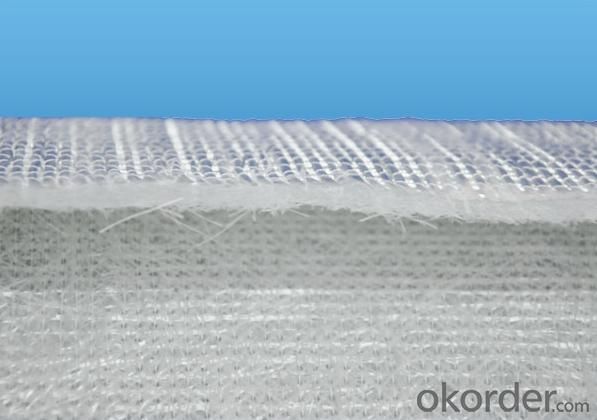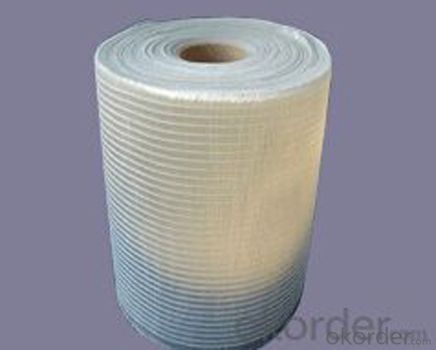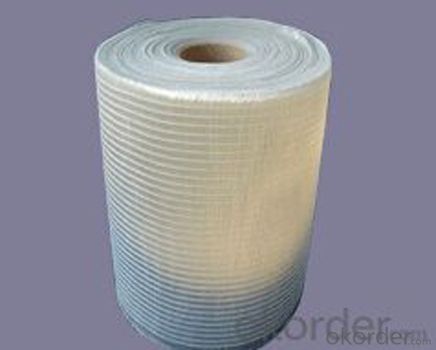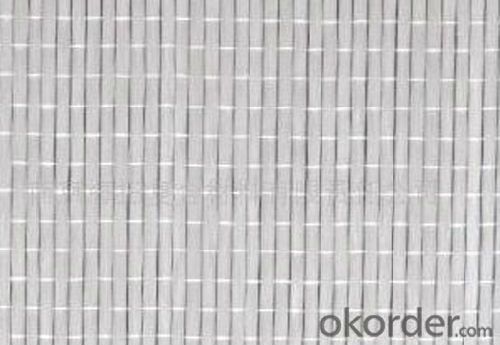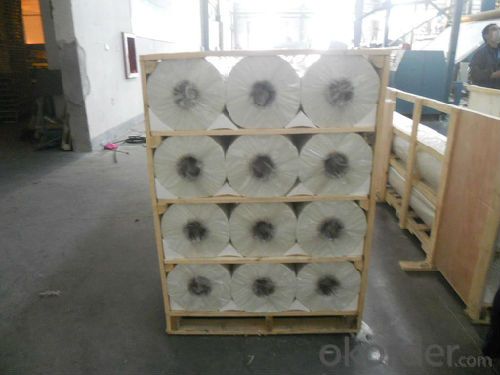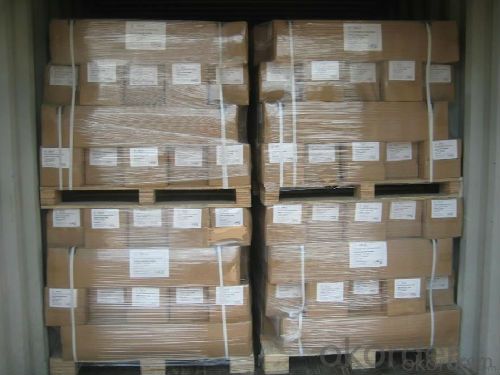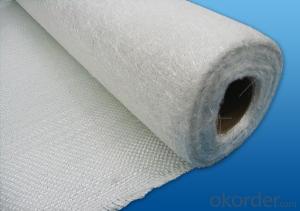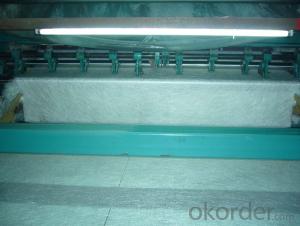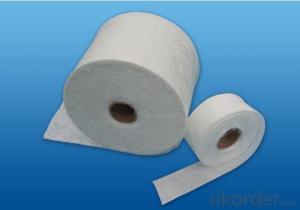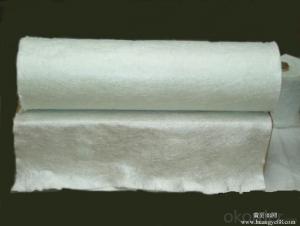Fiberglass Mat Tissue - e-glass fiber stitched combo mat 225g with high quality
- Loading Port:
- Shanghai
- Payment Terms:
- TT or LC
- Min Order Qty:
- 10000 m²
- Supply Capability:
- 500000 m²/month
OKorder Service Pledge
OKorder Financial Service
You Might Also Like
Description & application | ||||||||||||||||||||||||
◎ The stitched mat is made of chopped strand which randomly dispersed and be stitched together by polyester thread. The width is available from 150-2400mm.Density of mat generally is 300-600g/m2. | ||||||||||||||||||||||||
| ||||||||||||||||||||||||
◎ Uniform thickness, good wet tensile strength retention. ◎ Excellent mechanical properties | ||||||||||||||||||||||||
| ||||||||||||||||||||||||
| ||||||||||||||||||||||||
| ||||||||||||||||||||||||
Each roll is wrapped by PE film and then packed into carton. Stacking in bulk or palletized is available, the pallet shall be no higher than 2 layers.
|
- Q: Is fiberglass mat tissue resistant to moisture?
- Yes, fiberglass mat tissue is resistant to moisture.
- Q: How is fiberglass mat tissue used in the production of sports equipment?
- Fiberglass mat tissue is widely used in the production of sports equipment due to its unique properties and advantages. This material is a non-woven fabric made from fine glass fibers bonded together with a binder. It has a smooth texture and is lightweight, yet strong and durable. In the production of sports equipment, fiberglass mat tissue is typically used as a reinforcing layer. It helps to enhance the strength and rigidity of the final product, making it more resistant to impact and stress. This is particularly important in sports equipment where durability and performance are crucial, such as in the manufacturing of surfboards, skateboards, snowboards, and tennis rackets. When constructing a surfboard, for example, fiberglass mat tissue is commonly layered over a foam core and then impregnated with epoxy resin. This combination creates a strong and lightweight structure that can withstand the forces exerted by the waves. Similarly, in snowboards and skateboards, fiberglass mat tissue is applied to the wooden core to provide additional strength and stiffness, allowing for better control and responsiveness. Moreover, fiberglass mat tissue is also used in the manufacturing of protective gear like helmets and shin guards. By incorporating this material into the production process, these items can be made more impact resistant and capable of absorbing shocks. This is vital in sports where there is a high risk of injury, as the fiberglass mat tissue acts as a protective layer, dispersing and reducing the force of impacts. Overall, fiberglass mat tissue plays a crucial role in the production of sports equipment by reinforcing structures, enhancing strength and durability, and improving performance. Its lightweight nature combined with its superior mechanical properties makes it an ideal choice for various sporting applications, ensuring athletes can rely on their equipment to perform at their best while minimizing the risk of injury.
- Q: Does fiberglass mat tissue require any special surface bonding agents?
- Special surface bonding agents are necessary for fiberglass mat tissue. It is commonly used as a reinforcement material in industries like construction, automotive, and aerospace. To achieve a strong bond between the fiberglass mat tissue and the substrate, a suitable bonding agent or adhesive is needed. The bonding agent plays a crucial role in creating a durable and robust bond between the fiberglass mat tissue and the applied surface. It enhances the overall strength, integrity, and performance of the composite material. Additionally, it prevents delamination or separation of the fiberglass mat tissue from the substrate. The type of bonding agent required may vary depending on the specific application and the substrate's properties. Typically, epoxy-based bonding agents are widely used for bonding fiberglass mat tissue due to their excellent bonding strength, chemical resistance, and durability. Before applying the bonding agent, it is essential to thoroughly clean the surface and remove any contaminants that may affect adhesion. The bonding agent can then be applied using appropriate techniques such as brushing, spraying, or rolling. In conclusion, special surface bonding agents are necessary for fiberglass mat tissue to ensure proper adhesion and enhance the performance of the composite material. The choice of bonding agent depends on the specific application and substrate properties. Adequate surface preparation is also crucial for achieving a strong and durable bond.
- Q: Does anyone know the hardness value of the heat conductive gasket? Does it contain the hardness of the carrier (glass fiber)?
- The purpose of glass fiber is to make the product more convenient for processing, containing a layer of glass fiber cloth, then the operation process is not easy to damage thermal conductive gasket
- Q: Does fiberglass mat tissue require any special precautions during transportation?
- Yes, fiberglass mat tissue does require special precautions during transportation. Fiberglass mat tissue is a delicate material that can easily get damaged if not handled properly. Therefore, it is important to take certain precautions to ensure its safe transportation. Firstly, the fiberglass mat tissue should be packed in a sturdy and durable packaging material that can protect it from any external impacts or vibrations. This can be achieved by using heavy-duty cardboard boxes or wooden crates that provide adequate cushioning and support. Additionally, it is crucial to label the packaging clearly as "Fragile" or "Handle with Care" to alert the handlers about the delicate nature of the product. This will help prevent any mishandling or rough treatment during transportation. Furthermore, fiberglass mat tissue should be stored and transported in an upright position to minimize the risk of any bending or folding that could potentially damage the material. It is also important to avoid stacking heavy objects on top of the fiberglass mat tissue to prevent any unnecessary pressure or crushing. Lastly, it is advisable to use secure and reliable transportation services that have experience in handling delicate materials like fiberglass mat tissue. This ensures that the product is transported with utmost care and attention, reducing the chances of any damage during transit. By following these special precautions, the risk of damage to the fiberglass mat tissue during transportation can be significantly minimized, ensuring that it reaches its destination in perfect condition.
- Q: What is the flexural strength of fiberglass mat tissue?
- The flexural strength of fiberglass mat tissue refers to its ability to resist bending or flexing without breaking. It is typically high due to the reinforcing properties of the fiberglass material, making it suitable for applications requiring structural integrity and resistance to deformation.
- Q: Does fiberglass mat tissue provide any acoustic insulation?
- Yes, fiberglass mat tissue provides acoustic insulation as it effectively absorbs and dampens sound waves, reducing noise transmission and improving soundproofing properties.
- Q: Can fiberglass mat tissue be used for insulating metal buildings?
- Fiberglass mat tissue is indeed capable of insulating metal buildings. This lightweight and flexible material offers efficient thermal insulation for metal structures. It is frequently applied as a layer between the metal panels and the interior of the building, effectively hindering heat transfer and enhancing energy efficiency. Moreover, fiberglass mat tissue resists moisture and discourages the growth of mold or mildew, making it an excellent option for insulating metal buildings. Nevertheless, it is crucial to ensure correct installation in order to optimize its insulation capabilities and avoid any gaps or air leakage.
- Q: Is fiberglass mat tissue suitable for automotive applications?
- Fiberglass mat tissue is indeed suitable for automotive applications. This versatile material offers numerous benefits when utilized in the automotive industry. It boasts excellent strength and durability, crucial qualities for automotive parts that must endure harsh conditions and heavy use. Moreover, fiberglass mat tissue possesses commendable thermal and electrical insulation properties, making it ideal for applications that require resistance to temperature and electrical currents. Furthermore, the lightweight nature of fiberglass mat tissue can contribute to enhanced fuel efficiency and overall vehicle performance. It is also highly malleable, enabling manufacturers to craft intricate automotive parts with precision. Additionally, this material resists corrosion, chemicals, and UV radiation, ensuring that automotive components remain reliable and long-lasting. In summary, the exceptional qualities of fiberglass mat tissue make it an optimal choice for various automotive applications, such as body panels, interior components, structural reinforcements, and sound insulation. Its strength, durability, insulation properties, lightweight nature, and resistance to corrosion and chemicals make it a dependable and cost-effective material for the automotive industry.
- Q: Is fiberglass mat tissue compatible with different types of resins?
- Fiberglass mat tissue is typically compatible with various resins. It is a versatile material that can be combined with different resins, such as polyester, epoxy, and vinyl ester resins. The compatibility between the fiberglass mat tissue and the resin relies on factors like the resin's specific type, formulation, and the intended use of the composite material. Nevertheless, in most situations, fiberglass mat tissue can be utilized with different resins to produce robust and long-lasting composite materials. To ensure optimal compatibility and performance, it is crucial to carefully adhere to the manufacturer's recommendations and guidelines for resin selection and application.
Send your message to us
Fiberglass Mat Tissue - e-glass fiber stitched combo mat 225g with high quality
- Loading Port:
- Shanghai
- Payment Terms:
- TT or LC
- Min Order Qty:
- 10000 m²
- Supply Capability:
- 500000 m²/month
OKorder Service Pledge
OKorder Financial Service
Similar products
Hot products
Hot Searches
Related keywords
